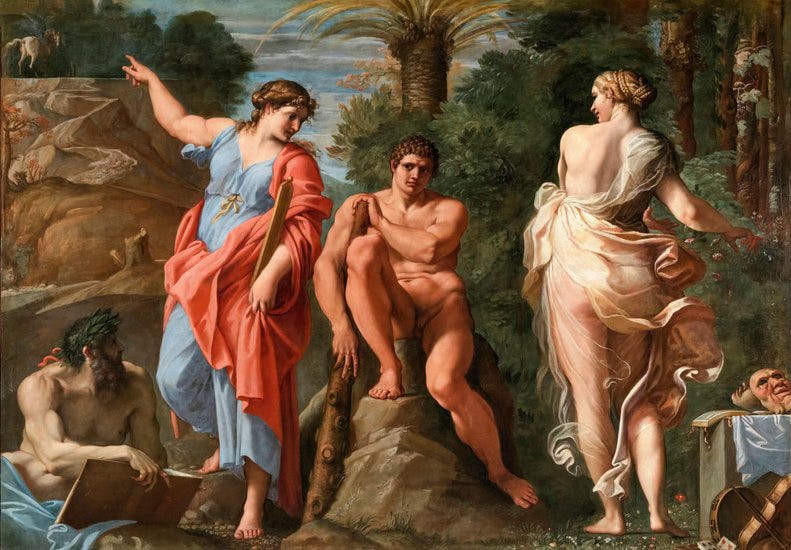Hercules at the Crossroads
Self-Government Starts with Self-Restraint
Ryan Holiday begins each of his four books on virtue with the same scene — Hercules at the crossroads.
Before Hercules restored order to the world by completing his twelve labors, he first had to choose between the steep, rugged road of Virtue and the soft, flowered road of Pleasure.
That moment so impressed John Adams that he proposed it for the official seal of the United States.
Adams believed a republic cannot survive unless its citizens choose the difficult good over the easy pleasant — not once, but daily.
In a monarchy, you can govern by force.
In an empire, you can govern by fear.
But a republic requires self-government — and self-government requires self-restraint.
Adams likely learned the tale from Xenophon’s retelling in Memorabilia, a story every educated man in 1776 knew well.
But somewhere after World War II, our national compass tilted from discipline toward ease — in our homes, schools, and offices.
Numbed by Comfort
The men who stormed Omaha Beach came home and wanted better — gentler — lives for their children. And slowly, through suburbs and credit cards and one-click convenience, comfort became normal. But ease has a way of softening the very strength their hardship produced.
Now even AI lives on our phones — eager to autocomplete our emails, summarize our books, map our errands, and think on our behalf.
Each new level of prosperity breeds new softness.
And this is what I keep circling back to — that the good is hard — and it’s the hardness that makes it good.
It looks like Rocky getting back up after being knocked down, showing up when you don’t feel like it, or honoring the dignity of work.
I see it in my own life. I carry a supercomputer in my pocket. I rarely wait for anything. I live in a world where comfort is only a click away — and every one of those conveniences erodes the muscle of choosing the harder good.
Again and again, I return to Theodore Roosevelt’s 1910 speech in Des Moines:“Nothing in this world is worth having or worth doing unless it means effort, pain, difficulty. No kind of life is worth leading if it is always an easy life.”
He wasn’t glorifying pointless suffering — he was naming the truth that the highest goods are never cheap.
The Enemy Within
Today, we prefer convenience over craftsmanship, self-expression over self-restraint, and dopamine over duty.
And that is exactly what Adams feared most.
In 1798 he wrote that the Constitution was “made only for a moral and religious people.”
In a private letter in 1814, he warned: “Democracy never lasts long. It soon wastes, exhausts, and murders itself.”
Britain was burning our Capitol and blockading our ports — yet he believed the real danger wasn’t foreign.
It was interior rot.
He believed the slow seduction of luxury is what destroys republics.
Which is why the path forward isn’t reinvention — it’s recovery.
It’s rediscovering what Adams wanted on our Great Seal from the beginning.
That a free people must choose virtue — daily. Because in a republic, national self-government flows downstream from personal self-government.
Stir the Embers
As I opened Holiday’s latest book (Wisdom Takes Work), my 11-year-old son glanced over my shoulder.
“Hercules at the crossroads — we just talked about that in English Lit.”
I smiled.
The old story still burns.
Virtue still glows.
Let’s stir the embers — and face the fork again.
Let’s choose the steep road — the road of virtue.
Image credit: Alamy
Sharing Midwestern values through the stories of a hard-working single dad, all for the glory of God.


